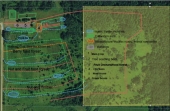First, I want to give a shout out to
Tristan for taking the time to write such a detailed and organized reply!
I'm in a similar situation, but with 40 acres that is 9 hours drive from our house in Texas. The subject property is in Arkansas. The acreage that we purchased has an off-grid one bedroom cabin. We also have a 3-5 year plan to move onto the AR property.
Our biggest challenge currently is
access. I mention this because all the permaculture knowledge in the world is going to be useless if you can't get on the property (or move around on it) easily.
Tristan described this well in
#4 of his reply. This should be your first priority since you already own the property. Your second priority should be creating a
budget: How are you gonna pay for all the cool plans you have?
Another biggie: How are you planning on handling the human excrement generated by you and yours? Septic? Humanure composting? I recommend reading the Humanure Handbook by
Joseph Jenkins. You can read the book for free here:
http://humanurehandbook.com
You mentioned doing
soil tests and I think that's a great idea. You can get a soil test for $20-$30. Go down about 6 inches per soil slice. You will take multiple slices for a planting area, mix them up, and pick out large debris. The quantity of your final sample will depend upon the testing facility - generally about 2 cups. The sample will also need to be dried out a bit if it's wet. Be sure to send the sample in a strong plastic Ziploc bag - you may even want to double bag it to prevent it from "exploding" in the shipping box.
http://www.soilminerals.com is a great link about soil testing and includes info about where to send your samples.
You talked about moving/planting
trees. Just remember that wildlife will eat and kill young trees. You may want to save that investment for when you can really monitor things - just in case that Sepp Holzer bone sauce doesn't work . . .
If you are planning on selling your crops, talk with your county extension office (or the equivalent in Canada, ey), as well as check out local markets to determine what grows/sells well in your area. Not everyone can grow oranges in the Alps like Sepp - start first with the stuff that you know should work. Don't forget to ask all the old-timers in the area about crops/flood events, etc per
Barbara's suggestion.
Livestock: Speaking from personal experience - animals tie you down - even pets like dogs and cats. Keep in mind that the more livestock you get, the harder it will be to leave the property for more than a day. Somebody will have to stay back with the farm or you'll have to hire someone to take care of things. My advice is to acquire animals slowly, in small numbers, and only when you are permanently residing on the farm. This will allow you to gauge your ability and desire to work with the animals without overextending yourself and the family. You'll also want to find out the "real" cost of caring for a particular animal. Frequently, the initial purchase of a pet/livestock animal is nothing compared to how much that booger costs afterwards. That said, chickens are a safe bet and you already have experience with them - so start there.
It sounds like you already have a lot of infrastructure in place, which is great. That will save you a lot of time and money

Good Luck!
- Jared



